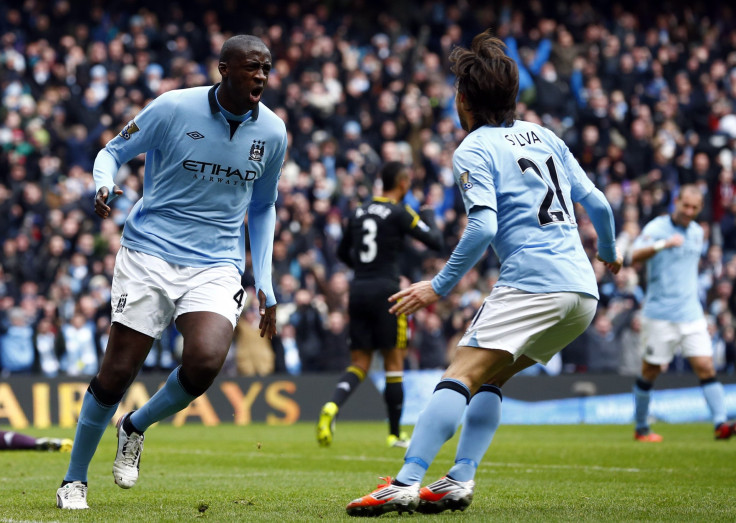From Russia With Hate: Yaya Toure Warns Black Soccer Players May Boycott 2018 World Cup Over Unrelenting Racist Behavior From Fans

Black soccer players may boycott the 2018 World Cup in Russia due to the toxic racist atmosphere in pitches in the country. Ivory Coast native Gnégnéri Yaya Touré, the star midfielder for Manchester City in the English Premier League, has warned that unless Russian sports officials eradicate racist behavior and chants in football stadiums, black players may not participate in the tournament. "If we aren't confident at the World Cup, coming to Russia, we don't come," he said, according to BBC.
Toure said he was racially abused during a Champions League game at the Khimki Arena in Moscow earlier this week by fans of the PFC CSKA Moscow club, triggering an investigation by the Union of European Football Associations (UEFA), the sport’s governing body in Europe. "I know we have the fight against racism, but we are not kids and we have to stop it now,” Toure said, according to The Guardian. “[UEFA] have to react. I want to stop this. It is always the same. I am unhappy because the reaction of the fans was unbelievable.”
CSKA officials, who have denied any such incidents took place, face a disciplinary hearing from UEFA on October 30. "Having carefully studied the video of the game, we found no racist insults from fans of CSKA," the club said in a statement. “In many occasions, especially during attacks on our goal, fans booed and whistled to put pressure on rival players, but regardless of their race.”
The Guardian reported that CSKA also took an extraordinary step by releasing statement from one its own black players -- Seydou Doumbia, also from the Ivory Coast -- accusing Touré of “exaggerating.” "I didn't hear anything like that from the CSKA fans,” Doumbia stated. “Yes, they're always noisy in supporting the team, and try to put as much pressure as possible on our opponents, but they wouldn't ever allow themselves to come out with racist chants. So my Ivory Coast colleague is clearly exaggerating."
But if UEFA determines that the racial abuse actually happened, they could force the CSKA to close a portion of its stadium in a future game. The group has already fully closed three stadiums -- Dinamo Zagreb of Croatia, Legia Warsaw of Poland and Honved of Hungary – for similar infractions this year.
Meanwhile, Piara Powar, executive director of Football Against Racism in Europe (FARE), supports Toure. "Yaya Toure is absolutely right in raising the specter of African players or players of African heritage not going to the 2018 World Cup -- and without them there will not be a World Cup in Russia,” Powar said. "I wouldn't blame them. In this era, players are the most powerful force, and if all the players said they are not going there wouldn't be a World Cup, or if there was it would be meaningless."
Another former player, Leroy Rosenior, who is one of the very few black team managers in the UK, suggested that a boycott of soccer’s largest event might actually force Fédération Internationale de Football Association, or FIFA (the sport’s international governing body) to clamp down on fan racism. "I think that it's got to a point now where, when we saw the reaction of CSKA, who didn't even recognize that there was a problem, people are starting to think that this isn't something that is stagnating. We're actually going backwards," Rosenior told BBC. "Boycotting the World Cup, which is sanctioned by FIFA, is a threat that maybe needs to be a serious threat because you want the authorities to come up with something off the back of a threat which will actually get something positive happening."
In May of this year, UEFA issued a warning for clubs that fail to eliminate racist chanting at their matches -- a partial stadium closure for the first offense; and a full stadium closure for a second offense, in addition to a fine of 50,000 euros ($69,000).
It is a delicate matter for the Russians, who clearly view the chance to host the World Cup as an honor. In a carefully worded statement, the 2018 FIFA World Cup Russia Local Organizing Committee said: "Whilst the alleged incidents are still under investigation by the relevant authorities, it is worth restating that all stakeholders in Russian football have made it clear that there is absolutely no place for any type of racial discrimination or abuse in our game. What is clear is that football is uniquely positioned to educate fans in combating this global issue. The 2018 FIFA World Cup in Russia, in particular, can act as a catalyst to positively change the mindsets and behavior across all involved in Russian football over the next four years."
Alistair Bruce-Ball, a BBC Sports correspondent in Moscow, wrote that Russia has been the site of a number of racist incidents on the pitch in recent years. “I can remember a set of fans waving a banana at [Brazilian player] Roberto Carlos when he played in Russia,” he wrote. “Peter Odemwingie [a mixed-race Russian], when he joined WBA [English club West Bromwich Albion], had some fairly horrendous stories of playing in Russia. [French-Congolese] Christopher Samba was another one who was targeted. The great point Yaya Toure made was that this [is] a country that is going to be hosting the World Cup, the pinnacle of all football events, in 2018 and yet the problem doesn't seem to be getting any better."
Throughout Europe, black soccer players have been verbally abused with "monkey chants" and some have been had bananas thrown at them.
© Copyright IBTimes 2025. All rights reserved.




















